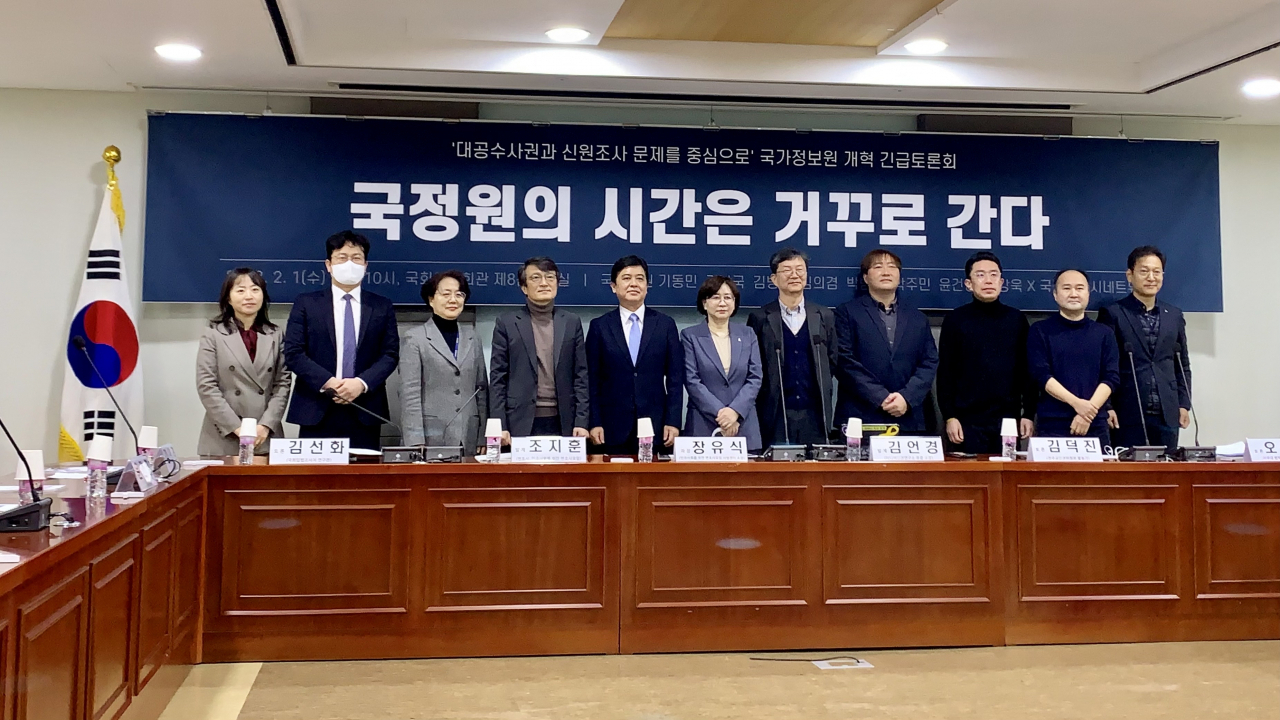
The push by the administration of previous President Moon Jae-in to take away investigative powers from the National Intelligence Service is being rolled back under President Yoon Suk Yeol, Democratic Party of Korea lawmakers claimed Wednesday.
Opposition party Reps. Youn Kun-young and Kim Eui-kyeom of the National Assembly’s intelligence committee reiterated in a conference that the top spy service should not be allowed to continue investigations of North Korean espionage and meddling.
Youn, who served as the state affairs planning and monitoring director at Moon’s Cheong Wa Dae, said in a written address the “conservative administration is continuously attempting to undo the reform of the NIS.” Removing the investigative function from the NIS had been the preceding administration’s “key reform policy,” he said.
“As a lawmaker on the intelligence committee, I am witnessing attempts by the NIS to meddle in politics,” he added.
In opening remarks, Kim, who is the spokesperson for the Democratic Party, suggested that the spy agency’s recent crackdown on an alleged spy ring for North Korea may be “signs that the NIS won’t give up its investigative duties.”
“The NIS has told me that the it is planning to run a unit to investigate North Korean spying jointly with the police, rather than handing the authority to the police completely. To me, this raises concerns that the NIS may exercise control over the police in the investigations,” the lawmaker claimed.
The ruling People Power Party Rep. Yoo Sang-bum, also on the parliamentary intelligence committee, said the claims by his Democratic Party colleagues were “untrue.”
“At Tuesday’s session of the intelligence committee, the NIS said that for the time being the investigations of espionage cases are conducted jointly with the police. This isn’t going to go on forever. The amended law says the investigative authority will be handed over to the police,” he said in a phone call with The Korea Herald.
In December 2020, the controversial amendment giving police authority to handle North Korean espionage investigations was passed unilaterally by the then-ruling Democratic Party, which still holds majority control of the National Assembly.
The amendment is set to come into effect in January next year, until which point the NIS retains its jurisdiction to investigate spies and spying activities.
Wednesday’s conference was attended by three member lawyers of Minbyun, or Lawyers for a Democratic Society.
In a statement, the progressive lawyers group compared the North Korean investigations under the Yoon administration to military dictatorship in the 1960s and '70s.
“The NIS is putting on a show of investigations to prove loyalty to the president. The ongoing investigations are only an attempt to mask the economic crisis and the administration’s series of failures in Itaewon disaster and in foreign relations,” the statement read.
Minbyun lawyers are representing four members of a pro-Korea unification group who were arrested early Wednesday over accusations of spying for North Korea. A panel of Seoul district court judges decided to issue arrest warrants for the four accused spies, about a day after prosecutors filed the request.
The pro-Korea unification group, which is based across the country, is accused of working with North Korean authorities and waging “anti-South Korean government activities.”
In a separate investigation of possible North Korean espionage, the Seoul office of South Korean umbrella labor organization Korean Confederation of Trade Unions was searched by intelligence authorities and police on Jan. 18 over suspected ties between North Korea and some of the organization’s officials.
The labor organization, the largest in the country, then blasted the search as “rule by terror” and “oppression.”
Spying for North Korea constitutes a violation of the National Security Act, a crime punishable by up to life in jail or the death penalty.





